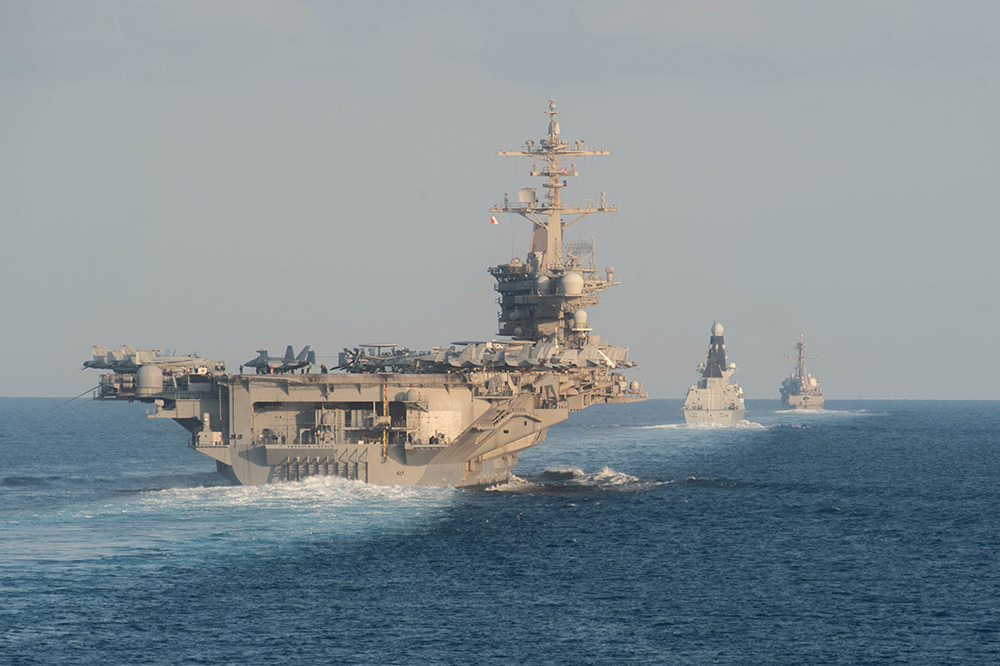
進入新的一周,,石油交易員面臨的情況是,世界已經(jīng)發(fā)生巨變,。在哈馬斯發(fā)動突然襲擊后,,戰(zhàn)爭突然爆發(fā),以色列宣布進入“戰(zhàn)爭狀態(tài)”,,市場恐慌情緒和不確定性可能會推高原油價格。
III Capital Management公司首席經(jīng)濟學家卡里姆·巴斯塔(Karim Basta)對路透社表示:“這場沖突帶來了油價上漲的風險,,也給通脹和經(jīng)濟增長前景帶來了風險,?!?/p>
對沖基金經(jīng)理,、頂級能源交易員皮埃爾·安杜蘭德(Pierre Andurand)周日在X上指出,很多人問他“哈馬斯對以色列的襲擊是否會對油價產(chǎn)生影響”,。
雖然安杜蘭德預計這場沖突在未來幾天內(nèi)不會對石油供應產(chǎn)生重大影響,油價也不會大幅飆升,,但他承認,,全球石油庫存處于低位,“沙特和俄羅斯的減產(chǎn)將導致未來幾個月內(nèi)庫存進一步減少,。市場最終將不得不乞求沙特增加供應,,我認為,這在布倫特原油價格低于每桶110美元的情況下是不可能發(fā)生的,?!?
布倫特原油目前的價格約為每桶88美元,,自以色列遭受襲擊以來,,油價已經(jīng)上漲逾3%,。今年9月,,美國能源情報署(U.S. Energy Information Administration)發(fā)布了短期能源展望,稱由于沙特將減產(chǎn)延長至年底,,該機構(gòu)預計第四季度原油價格為“平均每桶93美元”,,隨著庫存增加,原油價格將從明年開始下跌,。
當然,,這是在本周末沖突爆發(fā)之前的預測。該機構(gòu)的下一份展望報告將于本周發(fā)布,。
安杜蘭德指出,,由于制裁執(zhí)行不力,“在過去6個月里,,我們發(fā)現(xiàn)伊朗的供應量大幅增加”,。
當然,伊朗是哈馬斯的重要支持者,,鑒于此,,安杜蘭德認為,拜登政府“很有可能”開始對伊朗石油出口實施更嚴格的制裁措施,。他寫道,,這將“進一步收緊石油市場”。
加拿大皇家銀行資本市場(RBC Capital Markets)首席大宗商品策略師,、前中央情報局(CIA)分析師赫利瑪·克羅夫特(Helima Croft)告訴彭博社:“伊朗仍然是一個巨大的未知數(shù),。以色列將升級其對伊朗的長期影子戰(zhàn)爭,無法預測的是伊朗將如何應對這種升級,?!?/p>
據(jù)彭博社報道,2011 年對伊朗實施制裁時,,伊朗威脅要封鎖霍爾木茲海峽(這條狹窄的航道輸送著全球約三分之一的石油(水運)),。伊朗放棄了這一威脅,而美國則密切監(jiān)視該航道是否有被破壞的跡象,。但這種情況發(fā)生的可能性,,無論多么極端,都暗示了交易員所面臨的不確定性。
風險投資公司Social Capital的首席執(zhí)行官查馬斯·帕里哈皮提亞(Chamath Palihapitiya)表示,,油價勢必會飆升,,他在周日寫道:“在兩場熱戰(zhàn)(以色列-哈馬斯沖突和俄烏沖突)以及歐佩克(OPEC)減產(chǎn)150萬桶、戰(zhàn)略石油儲備(SPR)與上世紀 80 年代中期水平持平的背景下,,油價怎么可能不再次飆升呢?”
位于芝加哥的價格期貨集團(Price Futures Group)的分析師菲爾·弗林(Phil Flynn)對市場觀察網(wǎng)(MarketWatch)表示:“肯定會出現(xiàn)恐慌交易。雖然短期內(nèi)不會對供應產(chǎn)生直接影響,,但顯而易見的是,,未來24到48小時內(nèi)的事態(tài)發(fā)展可能會改變這一情況?!保ㄘ敻恢形木W(wǎng))
譯者:中慧言-王芳
進入新的一周,,石油交易員面臨的情況是,世界已經(jīng)發(fā)生巨變,。在哈馬斯發(fā)動突然襲擊后,,戰(zhàn)爭突然爆發(fā),以色列宣布進入“戰(zhàn)爭狀態(tài)”,,市場恐慌情緒和不確定性可能會推高原油價格,。
III Capital Management公司首席經(jīng)濟學家卡里姆·巴斯塔(Karim Basta)對路透社表示:“這場沖突帶來了油價上漲的風險,也給通脹和經(jīng)濟增長前景帶來了風險,?!?/p>
對沖基金經(jīng)理、頂級能源交易員皮埃爾·安杜蘭德(Pierre Andurand)周日在X上指出,,很多人問他“哈馬斯對以色列的襲擊是否會對油價產(chǎn)生影響”,。
雖然安杜蘭德預計這場沖突在未來幾天內(nèi)不會對石油供應產(chǎn)生重大影響,油價也不會大幅飆升,,但他承認,,全球石油庫存處于低位,“沙特和俄羅斯的減產(chǎn)將導致未來幾個月內(nèi)庫存進一步減少,。市場最終將不得不乞求沙特增加供應,,我認為,這在布倫特原油價格低于每桶110美元的情況下是不可能發(fā)生的,?!?
布倫特原油目前的價格約為每桶88美元,自以色列遭受襲擊以來,,油價已經(jīng)上漲逾3%,。今年9月,美國能源情報署(U.S. Energy Information Administration)發(fā)布了短期能源展望,,稱由于沙特將減產(chǎn)延長至年底,,該機構(gòu)預計第四季度原油價格為“平均每桶93美元”,,隨著庫存增加,原油價格將從明年開始下跌,。
當然,,這是在本周末沖突爆發(fā)之前的預測。該機構(gòu)的下一份展望報告將于本周發(fā)布,。
安杜蘭德指出,,由于制裁執(zhí)行不力,“在過去6個月里,,我們發(fā)現(xiàn)伊朗的供應量大幅增加”,。
當然,伊朗是哈馬斯的重要支持者,,鑒于此,安杜蘭德認為,,拜登政府“很有可能”開始對伊朗石油出口實施更嚴格的制裁措施,。他寫道,這將“進一步收緊石油市場”,。
加拿大皇家銀行資本市場(RBC Capital Markets)首席大宗商品策略師,、前中央情報局(CIA)分析師赫利瑪·克羅夫特(Helima Croft)告訴彭博社:“伊朗仍然是一個巨大的未知數(shù)。以色列將升級其對伊朗的長期影子戰(zhàn)爭,,無法預測的是伊朗將如何應對這種升級,。”
據(jù)彭博社報道,,2011 年對伊朗實施制裁時,,伊朗威脅要封鎖霍爾木茲海峽(這條狹窄的航道輸送著全球約三分之一的石油(水運))。伊朗放棄了這一威脅,,而美國則密切監(jiān)視該航道是否有被破壞的跡象,。但這種情況發(fā)生的可能性,無論多么極端,,都暗示了交易員所面臨的不確定性,。
風險投資公司Social Capital的首席執(zhí)行官查馬斯·帕里哈皮提亞(Chamath Palihapitiya)表示,油價勢必會飆升,,他在周日寫道:“在兩場熱戰(zhàn)(以色列-哈馬斯沖突和俄烏沖突)以及歐佩克(OPEC)減產(chǎn)150萬桶,、戰(zhàn)略石油儲備(SPR)與上世紀 80 年代中期水平持平的背景下,油價怎么可能不再次飆升呢?”
位于芝加哥的價格期貨集團(Price Futures Group)的分析師菲爾·弗林(Phil Flynn)對市場觀察網(wǎng)(MarketWatch)表示:“肯定會出現(xiàn)恐慌交易,。雖然短期內(nèi)不會對供應產(chǎn)生直接影響,,但顯而易見的是,未來24到48小時內(nèi)的事態(tài)發(fā)展可能會改變這一情況,?!保ㄘ敻恢形木W(wǎng))
譯者:中慧言-王芳
Oil traders face a changed world heading into the new week. With the sudden eruption of war in Israel, following surprise attacks by Hamas, fear and uncertainty in markets could drive up crude oil prices.
“The conflict poses a risk of higher oil prices, and risks to both inflation and the growth outlook,” Karim Basta, chief economist at III Capital Management, told Reuters.
Hedge-fund manager Pierre Andurand, a top energy trader, noted on X on Sunday that many people had asked him “if the Hamas attacks on Israel will have an impact on oil prices.”
While Andurand does not expect a big impact on oil supply or a large price spike in the next few days, he acknowledged that global oil inventories are low “and the Saudi and Russian production cuts will lead to more inventories draws over the next few months. The market will eventually have to beg for more Saudi supply, which I believe, will not happen sub $110 Brent.”
Brent crude is currently priced at about $88, having jumped more than 3% since the attacks on Israel. In September, the U.S. Energy Information Administration offered its short-term energy outlook, writing that with Saudi Arabia’s extended production cut through year’s end, its forecast “averages $93 dollars per barrel” in the fourth quarter, with price declines beginning next year as inventories build.
Of course, that was before this weekend’s eruption of violence. The agency’s next outlook is due this week.
Andurand noted that “over the last 6 months we have seen a very large increase in Iranian supply” due to the weak enforcement of sanctions.
Iran, of course, is a big backer of Hamas, and, given that, Andurand believes there’s a “good probability” that the Biden administration will begin more strictly enforcing sanctions on Iranian oil exports. That would “further tighten the oil market,” he wrote.
“Iran remains a very big wild card,” Helima Croft, chief commodities strategist at RBC Capital Markets and a former CIA analyst, told Bloomberg. “Israel will escalate its long-running shadow war against Iran” and “what is unpredictable is how Iran would respond to such an intensification.”
When sanctions were imposed on Iran in 2011, the country threatened to block the Strait of Hormuz, a narrow shipping route that handles roughly a third of the world’s waterborne oil, according to Bloomberg. Iran backed away from the threat, with the U.S. closely monitoring the waterway for signs of disruption. But the possibility of such a scenario, however extreme, hints at the kind of uncertainty traders face.
Chamath Palihapitiya, CEO of VC firm Social Capital, suggested oil prices were bound to jump, writing on Sunday: “How does oil not spike again now on the back of two hot wars (Israel-Hamas and Russia-Ukraine) and a 1.5M barrel production cut by OPEC with an SPR [Strategic Petroleum Reserves] that is at the same level it was in the mid 1980s?”
“There is definitely going to be a fear trade put in place,” Phil Flynn, analyst at Price Futures Group in Chicago, told MarketWatch. “While in the short term there is no impact directly on supply, it’s obvious how things play out over the next 24 to 48 hours could change that.”






